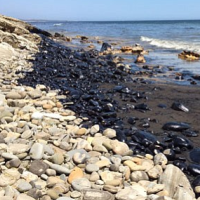Feds Wag Finger but Don’t Fine Oil Company for Santa Barbara Pipeline Spill
 Refugio State Beach (photo: Paul Wellman, Santa Barbara Independent)
Refugio State Beach (photo: Paul Wellman, Santa Barbara Independent)
A couple of weeks ago, when U.S. Senator Barbara Boxer (D-California) toured the Refugio State Beach north of Santa Barbara where a pipeline break spread oil for miles along the coast, she said, “I just think we have to hold this company to the highest standards until we can trust them. This economic and ecological disaster was a wakeup call.”
Apparently, not everyone is fully roused.
On Friday, the federal Pipeline and Hazardous Materials Safety Administration (PHMSA) announced its preliminary findings (pdf) that Plains All American Pipeline (PAAP) committed six “probable safety violations” in the 20 months leading up to the incident in May.
The Texas-based company was not fined for its transgressions.
It could have been subject to a civil penalty not to exceed $200,000 per violation per day (up to $2 million for a related series), but, PHMSA Western Region Director Chris Hoidal wrote, “We have reviewed the circumstances and supporting documents involved in this case, and have decided not to propose a civil penalty be assessed at this time.”
Plains was issued warnings to keep better records and told to do something about documenting its emergency response training program. Investigators couldn’t find evidence that supervisors were fully acquainted with emergency response procedures and “indicated evidence of a lack of familiarity with the California One-Call System.”
That might explain why the U.S. Coast Guard was already involved in the cleanup before Plains reported a problem.
The badly-corroded Plains pipeline that burst four months ago spilled more than 140,000 gallons of oil, much of it ending up in coastal waters. Plains did not notify the feds until three and a half hours after discovering the spill, although the law requires them to do it right away.
But that really wasn’t what PHMSA was looking at. The investigators were looking at two lines, one of which burst, that connect to offshore oil platforms and found that Plains didn’t keep adequate records of safety evaluations on them. The company couldn’t find internal safety evaluations on the lines, and pressure-testing records for tanks handling surges in hazardous material were inadequate.
Without testing and record-keeping, the company couldn’t perform risk analysis and maintenance. Robert Bea, a civil engineering professor at University of California, Berkeley, told the Associated Press, “In all the documentation I have reviewed concerning the pipeline, I have never seen evidence of any advanced risk assessment and management processes being used by Plains.”
Plains operates 18,000 miles of pipelines nationally.
The May incident was the largest coastal California oil spill in a quarter century. Santa Barbara has been kinda touchy about oil spills since 1969, when a blowout at a Union Oil platform in the channel spewed between 80,000 and 100,000 barrels—not gallons—of crude oil into the ocean.
–Ken Broder
To Learn More:
Long Before Oil Spill Blackened Beaches, Regulators Found Pipeline Operator Had Poor Records (by Brian Melley and Michael R. Blood, Associated Press)
Texas Firm in Santa Barbara Oil Spill Ordered to Fix “Probable” Safety Violations (by Javier Panzar, Los Angeles Times)
Pipeline Company Says Its Estimate of Santa Barbara Oil Spill Was Way Low (by Ken Broder, AllGov California)
Notice Of Probable Violation and Proposed Compliance Order (Pipeline and Hazardous Materials Safety Administration) (pdf)
- Top Stories
- Controversies
- Where is the Money Going?
- California and the Nation
- Appointments and Resignations
- Unusual News
- Latest News
- California Forbids U.S. Immigration Agents from Pretending to be Police
- California Lawmakers Urged to Strip “Self-Dealing” Tax Board of Its Duties
- Big Oil’s Grip on California
- Santa Cruz Police See Homeland Security Betrayal in Use of Gang Roundup as Cover for Immigration Raid
- Oil Companies Face Deadline to Stop Polluting California Groundwater





